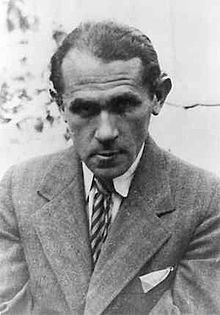Bruno Schulz
Bruno Schulz was a Polish writer, fine artist, literary critic and art teacher born to Jewish parents. He is regarded as one of the great Polishlanguage prose stylists of the 20th century. In 1938, he was awarded the Polish Academy of Literatures prestigious Golden Laurel award. Several of Schulzs works were lost in the Holocaust, including short stories from the early 1940s and his final, unfinished novel The Messiah. Schulz was shot and killed by a German Nazi in 1942 while walking back home toward Drohobycz Ghetto with a loaf of bread.
Schulz was born in Drohobych, Austrian Galicia, historically part of the Kingdom of Poland before the three partitions, and today part of Ukraine. After World War One, Drohobycz became part of the Lww Voivodeship. Bruno Schulz was the son of cloth merchant Jakub Schulz and Henrietta ne Kuhmerker. At a very early age, he developed an interest in the arts. He attended school in Drohobych from 1902 to 1910, after which he studied architecture at Lviv Polytechnic. His studies were interrupted by illness in 1911 but he resumed them in 1913 after two years of convalescence. In 1917 he briefly studied architecture in Vienna. At the end of World War I, when he was 26, Drohobycz became part of the newly reborn Polish Second Republic. Schulz taught drawing in a Polish school from 1924 to 1941. His employment kept him in his hometown, although he disliked the teaching, apparently maintaining his job only because it was his sole source of income.
Source: Wikipedia

